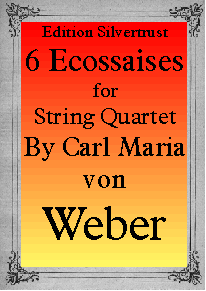Until July 1, to place order you must email us at editionsilvertrust@gmail.com
Carl Maria von Weber
 |
 |
We were unable to find a recording by a string quartet and have used one by a chamber orchestra which simply has doubled the early arrangement for string quartet |
Six Ecossaises for String Quartet
Despite its name, the Ecossaise, or Schottisch as it was called in German, almost certainly is not of Scottish origin, but most likely originated in either France or Germany as an imitation of Scottish airs. The Ecossaise, in this guise, is a lively dance usually in 2/4 time. During the first two decades of the 19th century it became highly popular in the dance halls of Europe. Composers such as Beethoven, Schubert, Chopin and Weber wrote stylized versions of the Ecossaise, which is characterized by its use of dynamic contrast with fortissimos and pianissimos coming very close after each other.
Weber's Six Ecossaises, an early work, were originally composed for the piano in 1802. Weber, who was then only 16, dedicated them signficantly to the "fair sex of Hamburg." At that time, every well brought up young lady could play the piano and it was for them that these charming dances were no doubt intended. They immediately achieved wide popularity and Weber's publishers insisted he produce them in arrangements for string quartet, piano trio, and even orchestra as well as several other combinations. The original, because of the interesting writing for the left hand, lent itself to arrangements for string quartet or chamber orchestra.
The musical reputation of Carl Maria von Weber (1786-1826) rests almost entirely on his famous operas Die Freischutz and Oberon and a few other works such as his clarinet concertos. But Weber’s music by and large is unknown to present day players and listeners, which is a pity since it is uniformly well-written. Weber studied with Michael Haydn in Salzburg the Abbe Vogler in Vienna, two of the leading teachers of their day. He pursued a career as a conductor and music director holding posts in Breslau, Prague, Berlin and Dresden.
These lovely little pieces could be used either separately or together to make a charming encore or short program piece.
Parts: $13.95